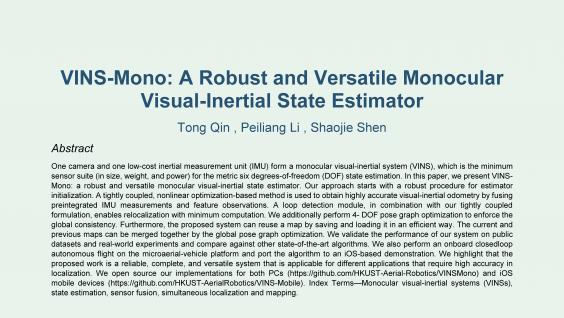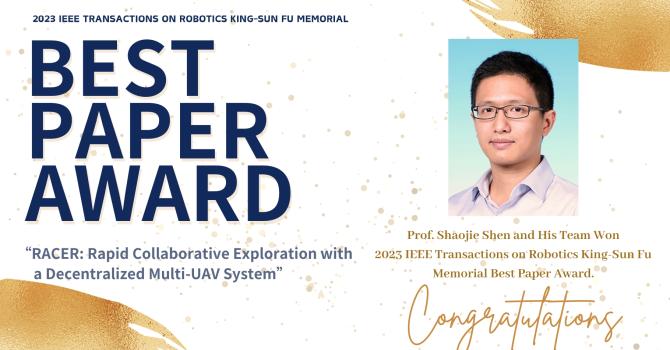Paper by Prof. Shaojie Shen and his postgraduate students Received Honorable Mention for the IEEE Transactions on Robotics King-Sun Fu Memorial Best Paper Award
The paper, “VINS-Mono: A Robust and Versatile Monocular Visual-Inertial State Estimator” by Tong QIN, Peiliang LI and Prof. Shaojie SHEN published in the IEEE Transactions on Robotics, volume 34, number 4, pages 1004-1020, August 2018 has been chosen to receive Honorable Mention status for the IEEE Transactions on Robotics King-Sun Fu Memorial Best Paper Award. This award is established to recognize the best paper published annually in the IEEE Transactions on Robotics.
The work of Prof. Shaojie SHEN and his postgraduate students Tong QIN and Peiliang LI will be recognized during the Awards Luncheon at the International IEEE Conference on Robotics and Automation (ICRA) to be held in Montreal from 20-24 May 2019.
Abstract of the Paper
One camera and one low-cost inertial measurement unit (IMU) form a monocular visual-inertial system (VINS), which is the minimum sensor suite (in size, weight, and power) for the metric six degrees-of-freedom (DOF) state estimation. In this paper, we present VINS-Mono: a robust and versatile monocular visual-inertial state estimator. Our approach starts with a robust procedure for estimator initialization. A tightly coupled, nonlinear optimization-based method is used to obtain highly accurate visual-inertial odometry by fusing preintegrated IMU measurements and feature observations. A loop detection module, in combination with our tightly coupled formulation, enables relocalization with minimum computation. We additionally perform 4-DOF pose graph optimization to enforce the global consistency. Furthermore, the proposed system can reuse a map by saving and loading it in an efficient way. The current and previous maps can be merged together by the global pose graph optimization. We validate the performance of our system on public datasets and real-world experiments and compare against other state-of-the-art algorithms. We also perform an onboard closed-loop autonomous flight on the microaerial-vehicle platform and port the algorithm to an iOS-based demonstration. We highlight that the proposed work is a reliable, complete, and versatile system that is applicable for different applications that require high accuracy in localization. We open source our implementations for both PCs (https://github.com/HKUST-Aerial-Robotics/VINS-Mono) and iOS mobile devices ( https://github.com/HKUST-Aerial-Robotics/VINS-Mobile).




